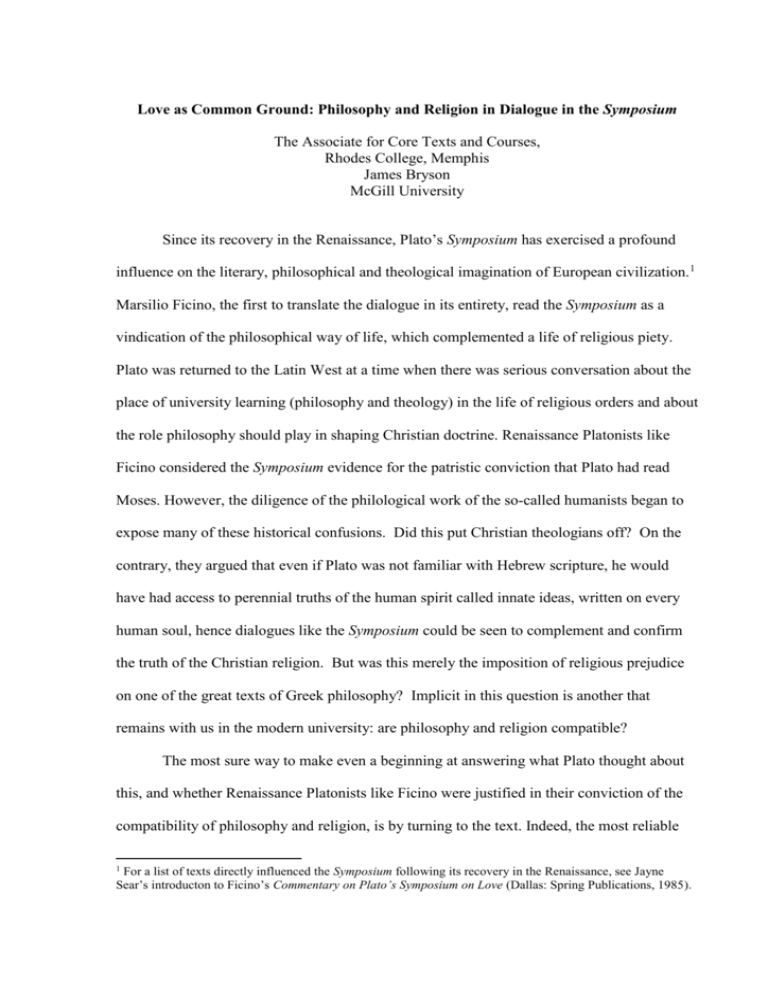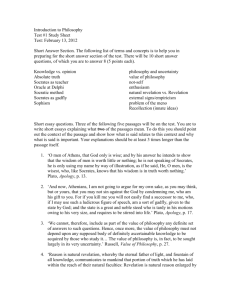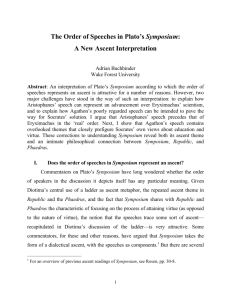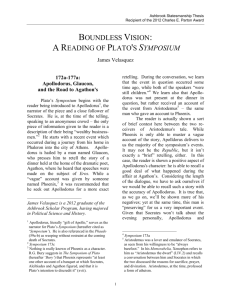Love as Common Ground: Philosophy and Religion in Dialogue in
advertisement

Love as Common Ground: Philosophy and Religion in Dialogue in the Symposium The Associate for Core Texts and Courses, Rhodes College, Memphis James Bryson McGill University Since its recovery in the Renaissance, Plato’s Symposium has exercised a profound influence on the literary, philosophical and theological imagination of European civilization.1 Marsilio Ficino, the first to translate the dialogue in its entirety, read the Symposium as a vindication of the philosophical way of life, which complemented a life of religious piety. Plato was returned to the Latin West at a time when there was serious conversation about the place of university learning (philosophy and theology) in the life of religious orders and about the role philosophy should play in shaping Christian doctrine. Renaissance Platonists like Ficino considered the Symposium evidence for the patristic conviction that Plato had read Moses. However, the diligence of the philological work of the so-called humanists began to expose many of these historical confusions. Did this put Christian theologians off? On the contrary, they argued that even if Plato was not familiar with Hebrew scripture, he would have had access to perennial truths of the human spirit called innate ideas, written on every human soul, hence dialogues like the Symposium could be seen to complement and confirm the truth of the Christian religion. But was this merely the imposition of religious prejudice on one of the great texts of Greek philosophy? Implicit in this question is another that remains with us in the modern university: are philosophy and religion compatible? The most sure way to make even a beginning at answering what Plato thought about this, and whether Renaissance Platonists like Ficino were justified in their conviction of the compatibility of philosophy and religion, is by turning to the text. Indeed, the most reliable 1 For a list of texts directly influenced the Symposium following its recovery in the Renaissance, see Jayne Sear’s introducton to Ficino’s Commentary on Plato’s Symposium on Love (Dallas: Spring Publications, 1985). way to read any Platonic dialogue is to the read it from start to finish and as a whole, principles that guide the core text tradition in North America. Modern methods of historical analysis risk obscuring the enduring value of Platonic texts. The controversial nature and persistent relevance of its subject matter puts the Symposium at special risk, a risk of which Plato himself was keenly aware. As our keynote speaker, Roger Scruton, rightly points out in his discussion of Plato’s philosophy of desire, Diotima’s revelation to Socrates, taken on its own, ought to be regarded as ‘intolerable’ because it discards the incarnate individual for the splendor of metaphysical abstraction.2 Fortunately, this is not the whole story. Scholars like Stanley Rosen note the limits of reading the Symposium this way, and more recently Kevin and wife Corrigan caution against methodologies that neglect the whole for the parts.3 Interpretations of the Symposium are especially susceptible to this kind of method since it is neatly divided into speeches. Both Rosen and the Corrigans see the Symposium as a work of art, which drives their point home about the importance of reading the text as a whole. It brings to mind the argument Professor Scruton often makes about the absurdity of reducing the Mona Lisa to a smear of pigments, or a Beethoven symphony to a series of tones that computers can reproduce.4 Looked at in this way, it becomes much more obvious that isolating an argument here or there in a Platonic dialogue, nevermind in the most artful of all the Platonic dialogues, is a seriously misguided enterprise. In the Symposium, the philosophical argument emerges from the traditional Socratic dialogical method, the persuasive power of the speeches, the dramatic context, the beauty of the poetry and prose, and indeed from the inherent content of its subject matter, eros.5 2 Roger Scruton, Sexual Desire: A Philosophical Investigation (London: Weidenfeld & Nicolson, 1986), p. 223. Stanley Rosen, Plato’s Symposium (New Haven: Yale University Press, 1968); Kevin & Elena Corrigan, Plato’s Dialectic at Play: Argument, Structure and Myth in the Symposium (University Park, PA: Pennsylvania University Press, 2004). 4 See, for example, Scruton’s The Soul of the World (Princeton: Princeton University Press, 2014), p. 40. 5 I will use eros and love interchangably in this paper. 3 As I hope to show (albeit in a cursory way) in what follows, the Symposium makes a persuasive case for the complementarity of philosophy and religion, embodied in the ‘erotic’ personality of Socrates. Plato wants to persuade us that philosophy points towards, and in some sense embodies, a religious way of life. Like religion, philosophy concerns itself with the ‘fallen’ state of human nature and man’s prospects for happiness. The erotic character of the philosophical way of life drives the philosopher towards a unified vision of the cosmos, which subsequently comes to govern his relation to both Gods and men. *** It is crucial to the dramatic argument of the Symposium that party’s theme is proposed by the physician in attendance, Eryximachus, although he claims it was Phaedrus who inspired him (177a-d). Plato regularly explains that philosophy is in the business of healing – it is the pharmacon offered to the divided human psyche. (It is also important to remember that he philosopher sees himself as analogous to the midwife). Socrates expresses his enthuasiasm for the proposed topic, since ‘love-matters’ are the one subject about which he claims to know something (177e). As the ‘father of the debate’, Socrates insists that Phaedrus make the opening speech. In many ways, the end is in the beginning. Phaedrus draws on the authority of the traditional Greek religion as recorded by Homer and Hesiod (178a ff). He praises eros as the most ancient of the Gods since he does not have any parents. Eros brings order to the chaos and earth and governs the most important elements of human affairs, including civic life, war, friendship, romantic love and the afterlife. The argument of the dialogue as a whole is contained in Phaedrus’ speech, but it also contains a fundamental flaw which is not exposed until Socrates cross-examines Agathon. Pausanias follows Phaedrus. He moves away from Phaedrus’ cosmic vision of eros and attempts to break it down into its constituent parts (180c ff). Love can be vulgar or heavenly, concerned exclusively either with the body or the soul. Heavenly love is proud and happy to have a public face, whereas vulgar love is ashamed, motivated as it is by utilitarian self-interest – the gratification of base desires. Heavenly love, by contrast, is open because the lover is concerned with the virtue and intelligence of his beloved. Pausanias makes his arguments within the context of the Athenian cultural norms, including the education of boys by men, but his philosophical point transcends these particularities – this is certainly Plato’s view, which is made clear by the end of Alcibiades’ speech. Eryximachus, the physician, accepts Pausanias’ division of eros into the apparently opposed tendencies in the lover to desire either the body or the soul of his beloved (186a ff). However, he rejects the stark division of lovers into one category or the other, explaining that a lover should strike a balance between these apparently opposed tendencies. This, he explains, is what the physician attempts to do when restoring or maintaining a person’s health. Indeed, there is a correlation between a person’s physical health and his fitness as a lover: a healthy person will have a healthy love life. Maintaining a sound body and mind, Eryximachus concludes, affords a lover the possibility of friendship with the Gods themselves, but on this last point he defers to Aristophanes. Aristophanes is above all concerned with the hubris of the human lover (189c ff). The failure of men to have erected a cult to eros demonstrates the perennial hubris of humanity, since ahead of all Gods love is most concerned human happiness and well being. Follow the influence of love in the world and you will discover the origins and development of mankind. The myth of the original union of the sexes in Aristophanes is well known and its message seems to be clear: the original humans or hermaphrodites did not know the difference between themselves and the Gods, a confusion owing to their recognition of themselves in what they worshipped. They sought to become the objects of their own devotion – in the language of love they sought to become both lover and beloved. Love serves as a reminder, according to Aristophanes, of the hubris our original condition, but it also directs us to our properly appointed end as lovers who seek to be united to our fellow man in the full knowledge of the difference between ourselves and the Gods. In this sense, the memory of our original condition as lovers heals our naturally hubristic tendencies. Speaking of hubris, Agathon, the host of the party, follows Aristophanes in the build up to Socrates’ speech (194e ff). The ironies of the speech are many and layered. Aristophanes had just delivered a colorful and poignant speech about the dangers of selfworship, and, as Socrates points out immediately afterward, Agathon in fact gives a speech about himself while claiming to describe the God of love. His speech both contradicts (from his point of view) and mirrors (from the point of view of the dialogue as a whole) that of Phaedrus. Love is not the most ancient God, as Phaedrus claimed, but the most youthful. Old things are ugly and love is interested in beauty, hence love must be youthful. As Zeus did to Aristophanes’ hermaphrodites, Socrates cuts Agathon down to size with reason, the philosopher’s tool, but not before Agathon utters a number of important truths about love despite himself, including its association with poetry, music and the Good itself. As we know, Agathon’s name means ‘Good’ in Greek; his speech is about both the God and himself without an appreciation of the difference. Following cross-examination by Socrates, Agathon is forced to admit that he didn’t know what he was talking about (201b). All of the preceding speeches are criticized implicitly as eulogies to a God. In fact, Socrates points out, love cannot be a God, because love is defined not by what it has but by what it lacks: if it is love of the Good, it cannot itself be Good – why would we desire something we already have (199c ff)? Socrates takes direct aim at Aristophanes, claiming that love is not of our other half, but of the Good itself. Love of the Good is what lies behind our romantic and filial impulses: it is the good of the beloved that we are attracted to and desire to possess. But even the notion of possession, as Diotima explains to Socrates, is not quite right. Both romantic and philosophical love desire to beget in the beautiful, since it is not enough merely to possess the goodness of another or an object of knowledge fleetingly. We desire to possess the Good forever. It is in this sense that love causes divine and mortal things to mix. As lovers, we have a share of divine things: just as parents are preserved by and in the memory of their children, philosophers are remembered for the truths they inherit and pass on to their students. Moreover, the love of the Good is its own reward, inspiring an ascent to the virtuous life which keeps the soul in the presence of the Good and the Beautiful. Why doesn’t the dialogue end here in the presence of Beauty itself? Aristophanes appears on the verge of voicing the concern of Professor Scruton (noted above) about the appalling disregard of the embodied human soul who first moved the lover to the ascend to the Beautiful (212c). Is this not a different version of the philosophical hubris Socrates warns us against? The answer, I believe, is to be found in the dramatic unfolding of the dialogue. Aristophanes is abruptly cut off by the entrance of the Athenian aristocrat and general Alcibiades, who speaks to the virtue of Socrates both in resisting his advances (apparently something of an unprecedented and staggering feat) and on the battlefield. In transpires that Socrates had saved Alcibiades’ life after he had fallen in battle, and then refused any reward for, or acknowledgement of, his heroism (215a ff). This is Socrates the very embodiment of the erotic way of life which informs every aspect of his being. Not only is he interested in abstract metaphysical arguments of the kind the priestess Diotima reveals to him, he is a courageous citizen and loyal friend, willing to pay the ultimate price for leading the life of a lover. One may even go so far as to suggest that it is precisely Diotima’s revelation that gives Socrates the courage to die in battle. As we come to understand from Alcibiades’ account, Socrates’ potential sacrifice is to not akin to Achilles’ willingness to die for Patroclus. He is not motivated by passionate attachment to his friend but from his duty as a citizen, which, as made clear in the Apology, coincides with the philosophical way of life to which he is compelled by the Delphic oracle. *** Where does this leave us? In Plato’s epistemology, the lover begins and perhaps remains at the level of opinion or belief; this reflects his religious disposition to which he his ultimately destined. This self-knowledge is philosophy’s most important contribution to human affairs: it provides men with the knowledge that they are religious creatures. A religious person knows the difference between himself and the Gods, since by definition he worships something outside of himself. It is the duty of the philosopher to remind his friends and compatriots of this most fundamental erotic truth. Perhaps the most important counterpoint to Socrates in the dialogue is Aristophanes who, through the use of myth, is also concerned with maintaining the right relation between Gods and men. Religion and philosophy are complementary. The philosopher’s task is to affirm and interpret the authority of religion, and it is religion that initiates, animates and concludes the philosopher’s journey to self-knowledge – at least according to Plato.









